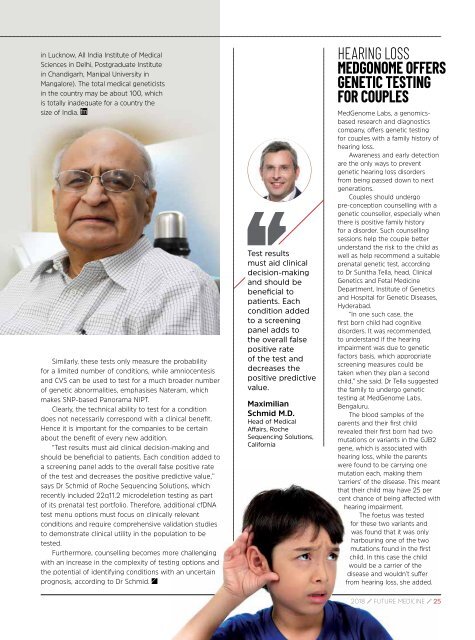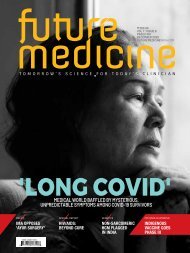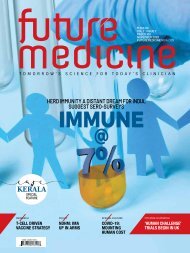You also want an ePaper? Increase the reach of your titles
YUMPU automatically turns print PDFs into web optimized ePapers that Google loves.
in Lucknow, All India Institute of Medical<br />
Sciences in Delhi, Postgraduate Institute<br />
in Chandigarh, Manipal University in<br />
Mangalore). The total medical geneticists<br />
in the country may be about 100, which<br />
is totally inadequate for a country the<br />
size of India.<br />
Similarly, these tests only measure the probability<br />
for a limited number of conditions, while amniocentesis<br />
and CVS can be used to test for a much broader number<br />
of genetic abnormalities, emphasises Nateram, which<br />
makes SNP-based Panorama NIPT.<br />
Clearly, the technical ability to test for a condition<br />
does not necessarily correspond with a clinical benefit.<br />
Hence it is important for the companies to be certain<br />
about the benefit of every new addition.<br />
“Test results must aid clinical decision-making and<br />
should be beneficial to patients. Each condition added to<br />
a screening panel adds to the overall false positive rate<br />
of the test and decreases the positive predictive value,’’<br />
says Dr Schmid of Roche Sequencing Solutions, which<br />
recently included 22q11.2 microdeletion testing as part<br />
of its prenatal test portfolio. Therefore, additional cfDNA<br />
test menu options must focus on clinically relevant<br />
conditions and require comprehensive validation studies<br />
to demonstrate clinical utility in the population to be<br />
tested.<br />
Furthermore, counselling becomes more challenging<br />
with an increase in the complexity of testing options and<br />
the potential of identifying conditions with an uncertain<br />
prognosis, according to Dr Schmid.<br />
Test results<br />
must aid clinical<br />
decision-making<br />
and should be<br />
beneficial to<br />
patients. Each<br />
condition added<br />
to a screening<br />
panel adds to<br />
the overall false<br />
positive rate<br />
of the test and<br />
decreases the<br />
positive predictive<br />
value.<br />
Maximilian<br />
Schmid M.D.<br />
Head of Medical<br />
Affairs, Roche<br />
Sequencing Solutions,<br />
California<br />
HEARING LOSS<br />
MEDGONOME OFFERS<br />
GENETIC TESTING<br />
FOR COUPLES<br />
MedGenome Labs, a genomicsbased<br />
research and diagnostics<br />
company, offers genetic testing<br />
for couples with a family history of<br />
hearing loss.<br />
Awareness and early detection<br />
are the only ways to prevent<br />
genetic hearing loss disorders<br />
from being passed down to next<br />
generations.<br />
Couples should undergo<br />
pre-conception counselling with a<br />
genetic counsellor, especially when<br />
there is positive family history<br />
for a disorder. Such counselling<br />
sessions help the couple better<br />
understand the risk to the child as<br />
well as help recommend a suitable<br />
prenatal genetic test, according<br />
to Dr Sunitha Tella, head, Clinical<br />
Genetics and Fetal Medicine<br />
Department, Institute of Genetics<br />
and Hospital for Genetic Diseases,<br />
Hyderabad.<br />
“In one such case, the<br />
first born child had cognitive<br />
disorders. It was recommended,<br />
to understand if the hearing<br />
impairment was due to genetic<br />
factors basis, which appropriate<br />
screening measures could be<br />
taken when they plan a second<br />
child,” she said. Dr Tella suggested<br />
the family to undergo genetic<br />
testing at MedGenome Labs,<br />
Bengaluru.<br />
The blood samples of the<br />
parents and their first child<br />
revealed their first born had two<br />
mutations or variants in the GJB2<br />
gene, which is associated with<br />
hearing loss, while the parents<br />
were found to be carrying one<br />
mutation each, making them<br />
‘carriers’ of the disease. This meant<br />
that their child may have 25 per<br />
cent chance of being affected with<br />
hearing impairment.<br />
The foetus was tested<br />
for these two variants and<br />
was found that it was only<br />
harbouring one of the two<br />
mutations found in the first<br />
child. In this case the child<br />
would be a carrier of the<br />
disease and wouldn’t suffer<br />
from hearing loss, she added.<br />
<strong>2018</strong> / FUTURE MEDICINE / 25


















